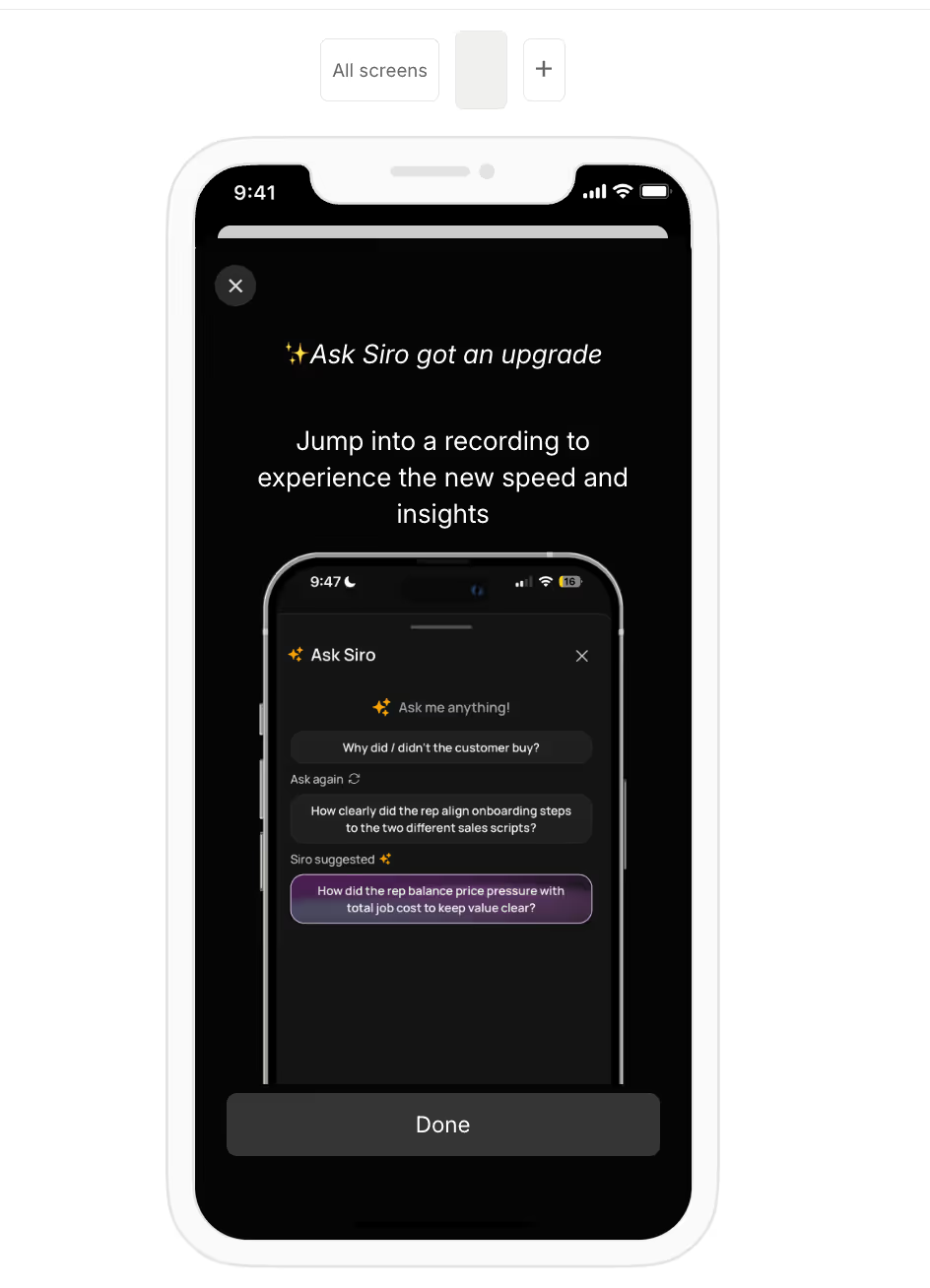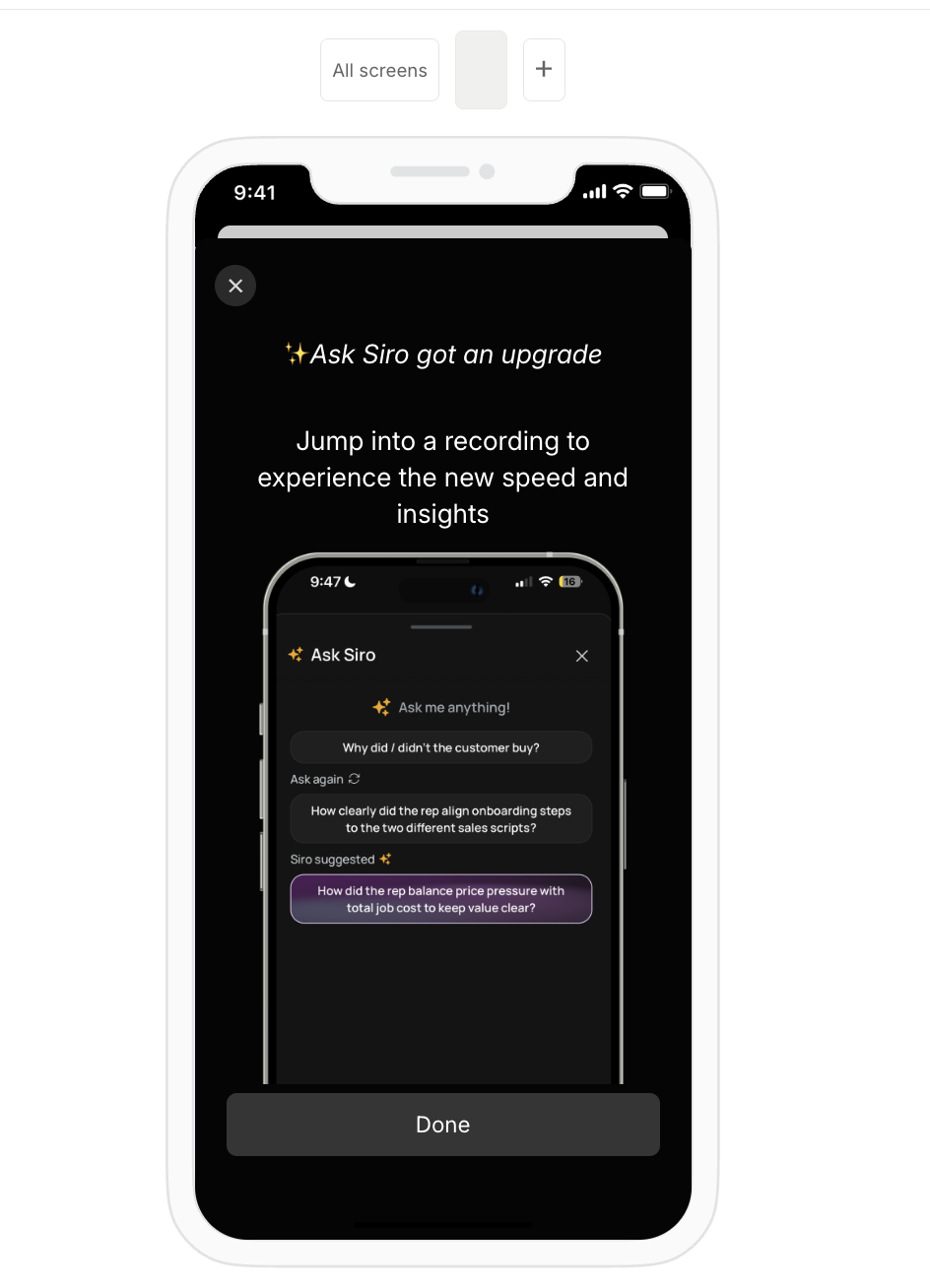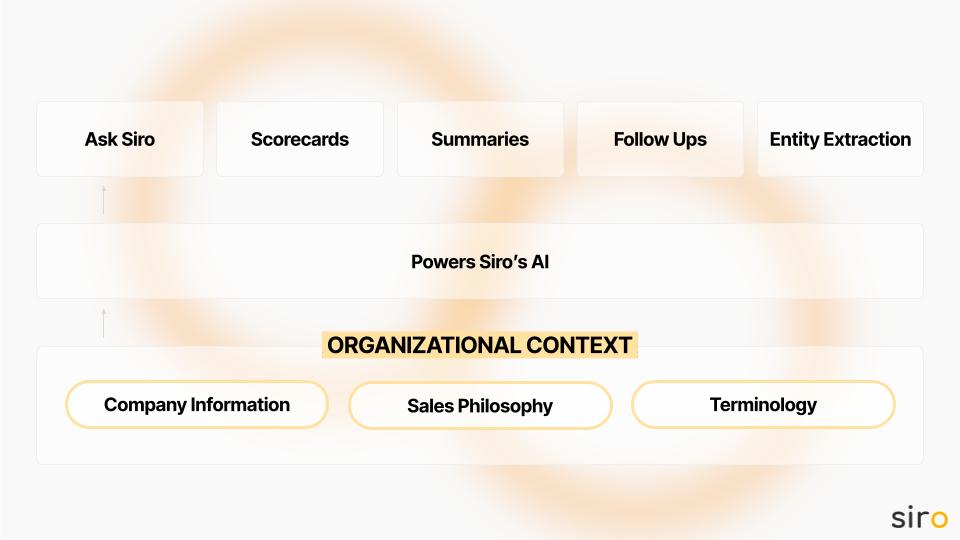
The No-Nonsense Guide to Recording Field Sales and Service Conversations


This guide is your all-access pass to making recording work for you. No fluff, just no-nonsense guidance regarding:
- Recording benefits
- Addressing common concerns
- Best practices for selecting a vendor
- Best practices for rolling out recording
- Integrating recording into your SOPs for ongoing success

Introduction
Let's cut to the chase: have you considered recording your field sales and service teams?
If you're hesitating, you're not alone. Most outside sales industry pros see the potential but get hung up on the "what ifs," like privacy concerns, team pushback, and ROI doubts. That’s valid.
But you simply can’t afford to let that stop you. Businesses that record are seeing game-changing results — higher close rates, streamlined quality control, and teams that consistently improve performance.
Why Record Your Field Teams?
1. Accountability drives performance
Recording isn't about managing like “Big Brother.” It's about raising the bar.
Joe Jordan, Co-Founder and Co-CEO of Siro, built the recording app to solve a problem he faced moving from a top 1% CutCo sales rep to a sales manager.
“When I became a manager, the biggest problem I had was I could not replicate the results that I had as a sales rep to my team,” Joe said.
Even as a top-performing manager, about a third of Joe’s team sold nothing. The average team member tenure was about a month. Out of 186 people, only three people ever came back to CutCo.
So Joe built Siro to shorten the feedback process from 1-2 hours per person to about 5 minutes.
It helped him consistently coach every team member, so they could grow.
On average, companies that implement recording 10x time savings on ride-alongs.
On the flipside for reps, recording created instant results – in part, simply because of increased accountability.
As Joe puts it, "When your team knows they're being recorded, they naturally step up. No more winging it — they follow the playbook, deliver consistently, and stick to best practices."
2. Real-time feedback keeps your team on track
It used to be impossible to know what’s happening in the field. Recording allows you to hear exactly why sales are lost and how your team represents your brand. If something is off, you can catch it instantly. When you find a winning approach, you can double-down on what's working.
unWired Broadband, a California-based internet company with 170 employees, began recording their sales team's calls in 2024.
When Nicholas Bradford, Field Sales Rep at unWired, started recording and reviewing calls, his monthly deals increased from 26 sales per month to 70 the next two months.
“The great thing about recording is just being able to listen to other people and also listen to yourself,” Nicholas said. “[It] has helped me greatly improve my sales and improve from how I introduce myself to the customer, all the way to the end with how I close.”
3. Peer learning keeps your playbook fresh
Recordings turn individual wins into team-wide playbooks. When one of your reps crushes a pitch or nails a tough situation, why not let everyone else in on the secret sauce? This approach accelerates skill development across your entire team.
Fiscor Heating and Cooling, an HVAC company in Arizona, holds weekly "game film" sessions where the team reviews recordings of sales and service conversations together.
It’s all part of a culture of excellence, said Kevin Fiscor, President of Fiscor Heating & Cooling.
“You really don't know what you look like or how you sound until you're looking at something,” Kevin said. “How this is helping our company grow is to be able to capture the most out of every single call and to be able to coach our employees on the sales process, the tune-up process, or even just presenting to customers.”
4. Onboarding that actually works
New hires learn from real-world examples to hit the ground running.
Chris Franzo is a Sales Manager at EZ Baths, a Louisiana-based bathroom remodeling company. Chris said he brought on a recording tool to help with onboarding and driving sales performance. The team’s revenue goal is $10M for 2024, and he shared they’re “well on the way.”
As one of the fastest-growing bath remodeling companies in the United States, Chris shared they have to rely on cutting-edge technology to keep up with growth.
“As you grow, you get more taxed with your time, “ Chris said. “[Recording] allows me to scale, and to deliver world-class training to heck of a lot more people.”
Now instead of going on ride-alongs or having a consultant describe a conversation, Chris uses recordings to coach. This has allowed him to pinpoint exactly where guidance is needed.
For instance, during a recording review session, a new consultant continued a consultation after the client mentioned they were happy to make design choices, but their partner would be paying for the project. Chris was then able to coach the consultant on how to realign the conversation and involve the partner in the decision-making process.
“I can't be everywhere with everybody, but what I am able to do now is I can find out exactly how it went – where their strengths are, and where their weaknesses are. Then I can find some of the areas that we can work on immediately,” Chris said.
5. Defense against customer disputes
When facing customer disputes, you’ll have a detailed, play-by-play record at your fingertips. Just hit play to review what happened, clear up misunderstandings, and protect your reputation.
Jordan Creason, is the VP of Technical Sales at Aruza Pest Control, a residential and commercial pest control company in North Carolina. He bought a recording tool for training and was pleasantly surprised by the added benefits of capturing every conversation.
Creason said there have been several times Aruza customers received a service, paid, then made an allegation of misrepresentation and asked for money back. In the past, without any proof otherwise, he’d often have to issue a refund. With recordings, he can verify the deal and Aruza has saved tens of thousands of dollars.
Jordan shared that to him, recording sales calls is like when police officers record with a body camera. “It’s to show, from their perspective, what's happening, and prove their innocence or justify the actions that they took.”
Addressing Potential Concerns
Is it legal to record field interactions?
Yes. In 39 states and Canada, only one party (your employee) needs to consent to the recording. In 11 “two-party consent” states, a simple disclosure at the beginning of the interaction is needed. Recording interactions is common in many industries, particularly for quality control and training purposes.
Will my team resist recording?
Once employees see the benefits, they tend to embrace recording. Peer-to-peer learning speeds up skill-building. Top performers can share their knowledge, and disputes are resolved more fairly. Real-life examples make training more engaging, and employees even have the chance to review and improve their own performance.
Start by focusing on positive reinforcement for the first 1-2 weeks, highlighting team wins. During this time, encourage team members to submit recordings for review. Once they're comfortable with recording and coaching, you can begin regular sessions that include both positive reinforcement and areas for improvement.
Semper Solr, a veteran-owned solar company in Illinois, uses recordings to streamline the setter-closer handoff and to help the team improve after every appointment.
“It’s very crucial, when I come in and sit down with the homeowner, so after I’m done with the conversation, whether I won it or didn’t win it, I’m able to go back and look into my conversation – see what I did right and see what I could’ve improved on,” said Luis Samano, a Solar Consultant at Semper Solr. “For my next homeowner sit-in, I know where to go from there.”
How will customers react?
Most customers appreciate the added transparency from recording. Capturing interactions often leads to more positive experiences, gives them confidence in the information they receive, and helps resolve any disputes quickly and fairly. It also allows companies to address concerns more effectively, improving service overall.
How to Select the Right Vendor
Recording sales conversations is more than just saving a voice note. The best tools also offer features for peer-to-peer learning, coaching and analysis.
Here’s your checklist for must-have features:
1. Transcript speed and accuracy:
The best tools provide accurate transcriptions within 5 minutes of an appointment, allowing for immediate review. They can also record conversations even without cellular service.
2. User-friendly interface:
Choose tools that make recording, searching, and analyzing simple. It’s even better if they encourage collaboration with features like comments and sharing examples.
3. Summaries and AI-powered analysis:
The tool should not only record conversations but also deliver actionable insights. Look for an AI chat feature that helps you explore questions like, "What could the rep have improved in this pitch?" Ideally, it will also provide examples in its responses.
4. Integrations:
Ensure the solution works with your existing systems, like ServiceTitan or SalesRabbit. Be sure to ask if a CRM is needed, or if the data can stand alone in the tool.
5. Analytics dashboard:
As a manager, gain deeper insights by reviewing detailed performance metrics. Pinpoint areas for improvement across the team and ensure reps stay accountable to your process.
6. Support and training:
Seek a focused approach with multiple live training sessions led by a dedicated Customer Success Manager (CSM). Ensure your CSM will help establish usage benchmarks, provide best practice guidance, and measure tangible results.
Aire Serv Heating & Air Conditioning, part of the Neighborly group, offers residential and commercial services across 200 locations throughout the United States and Canada. They faced issues with inconsistent communication and customer service, impacting their overall efficiency. They needed a solution to record service calls and provide actionable insights.
"Our technicians did not remember objections or crucial details from conversations, which affected our training and service delivery," Rebekah Hatcher, Operations Manager at Aire Serv said.
Once recording and analysis were put into place, Aire Serv could focus on significant parts of calls like estimates, financing, and sales objections.
Rebekah summarized, "We've been able to track improvements in our processes and technician performance, making our operations smoother and more efficient."
Best Practices for Rolling Out Your Recording System
Recording works best when you train your team on technical features and present it as a tool for collaboration and growth. Here are some best practices for change management:
1. Communicate early and often:
They needed a solution to improve service call recordings and provide actionable insights.
2. Focus on the benefits:
Highlight how recording can help reps (even top-performing reps!) learn, grow, and earn more.
3. Address concerns:
Directly address any privacy concerns and explain how recordings will be used.
4. Pilot program:
Start with a select group of reps and managers who will set the tone – this will also help you measure success against a control group.
5. Clear expectations:
Define what success looks like from day one, such as recording every conversation or reviewing at least one recording a day.
Getting team buy-in is easier when you frame up the bigger picture. Jordan Creason, VP of Technical Sales at Aruza Pest Control, addressed concerns with this logic: “You’re not lazy, and you’re not saying anything shady, so what’s the issue?”
Once it’s clear the tool isn’t for “spying,” it’s time to lean into the excitement of new possibilities.
“If hitting the record button before your next appointment could find one thing that makes you another $20,000 a year, wouldn’t that be worth it? Two seconds for $20,000? That’s like a down payment on a rental property,” Jordan shared with his team.
Ensuring Ongoing Success
It’s encouraging to see results as early as day one, when reps bring their A-game for the recording. But there’s so much more room for improvement. To maximize the impact of recording over time, consider:
1. Regular "film review" sessions:
Make analyzing recordings a team activity, just like athletes review game tape.
2. Performance coaching:
Use recordings for targeted, data-driven feedback.
3. Continuous improvement:
Regularly review and update your sales practices.
4. Celebrate wins:
Share success stories to build momentum.
5. Adapt and evolve:
Be willing to adjust your approach based on results and feedback.
Great Day Improvements, the second-largest home improvement company in the United States, started recording sales calls in 2023.
Mike Schember, Regional Sales Manager at Great Day Improvements, led the 3-month pilot.
One group did not record or review sales calls, while a second group, made up of team members with diverse experience and from different locations, started recording their calls.
“We picked the guys that were really excited to use it; that were open to use the technology,” Mike said, “because we believed that we would turn this into money. And that's exactly what we did.”
Within the 3 month pilot, Great Day Improvements saw a $756 per rep average yield increase, for the reps who recorded their sales conversations.
"If I applied that to all of our leads we ran last year, or bumped that number up on a grander scale company-wide, that would have equated to $42 million in additional sales,” Mike said.
Individual success stories were equally impressive: an Atlanta-based rep doubled his close rate within six months, and a Montgomery-based rep achieved a 41.4% close rate, becoming a top 5 rep nationally.
Over time, some team members stopped recording and reviewing calls, and their sales performance declined as a result. Mike believes recording isn’t a quick fix or a passing trend — it needs to be part of a culture of continuous learning. That's why Great Day Improvements holds regular ’'film review’ sessions to help the team learn together.
"Selling is a sport, and it's skill-based,” Mike said. “You can get better at it by working. We're watching film as a team, just like any other sports team."
The Bottom Line
Implementing a recording system for your field teams is more than just a trend — it's a powerful way to gain visibility, boost accountability, and drive growth. By carefully selecting the right vendor, rolling it out strategically, and ensuring continued engagement, you can maximize your sales and service operations.
Learn more about Siro
All of the companies mentioned use Siro to gain visibility, accountability, and improve performance through recording and coaching. Siro is ideal for teams of 5 or more sellers/technicians in Home Services, Home Improvement, or Door-to-Door. With support for both Apple and Android devices, Siro has already helped hundreds of companies and thousands of field pros by recording millions of customer interactions. Discover if Siro is the right fit for your team.
{{button}}

.webp)






